国际商务谈判教案Chapter4-(预习复习)
《商务谈判英语》电子教案 Unit4

Unit 4 The Content of Negotiation1
Inquiries can be made in either oral or written form. If the written form is adopted, whoever makes inquiries should consider carefully to which regions the inquiries are to be sent and how many suppliers or purchasers are to be approached in one and the same region. Having received the inquiry letter, the receiver should study it with caution and reply the inquiry letter as soon as possible, telling them whether you could sell or buy. If in oral form, the inquiries and replies will be very easy and simple, especially when the business relationships have been established between the buyers and the sellers
上一页 下一页 返回
Unit 4 The Content of Negotiation1
Offer and counter offer
Offers and counter offers are the middle two steps of business negotiation. According to The United Nations Convention on Contracts for the International Sale of Goods(CISG) ,an offer is a proposal for concluding a contract addressed to one or more specific persons if it is sufficiently definite and indicates the intention of the offer or to be bound in case of acceptance
北京大学 国际商务谈判(第四章)

报价的基本原则就是:通过反复比较和权衡,设法找出价 格所带来的利益与被接受的成功率之间的最佳结合点。
(三)最低可接纳水平
报价之前最好为自己设定一个“最低可接纳水平” 报价之前最好为自己设定一个“最低可接纳水平”。最低 可接纳水平是指最差的但却可以勉强接纳的最终谈判结果。 有了最低可接纳水平,谈判人员可避免拒绝有利条件或接 受不利条件,也可用来防止一时的鲁莽行动。在“ 受不利条件,也可用来防止一时的鲁莽行动。在“联合作 战”的场合,可以避免各个谈判者各行其是。
第三节 报价阶段的策略
三、进行报价解释时必须遵循的原则 不问不答——是指买方不主动问的问题卖方不要回答。 不问不答——是指买方不主动问的问题卖方不要回答。 有问必答——是指对对方提出的所有有关问题,都要一 有问必答——是指对对方提出的所有有关问题,都要一 一做出回答,并且要很流畅、很痛快地予以回答。 避虚就实——是指对己方报价中比较实质的部分应多讲 避虚就实——是指对己方报价中比较实质的部分应多讲 一些,对于比较虚的部分,或者说水分含量较大的部分, 应该少讲一些,甚至不讲。 能言不书——是指能用口头表达和解释的,就不要用文 能言不书——是指能用口头表达和解释的,就不要用文 字来书写,因为当自己表达中有误时,口述和笔写的东西 对自己的影响是截然不同的。
国际商务谈判(第四章) 国际商务谈判(第四章)
国际商务谈判各阶段的策略
本章学习重点
国际商务谈判各阶段策略—— 国际商务谈判各阶段策略—— 开局阶段的策略 报价阶段的策略 成交阶段的策略 处理僵局的策略
第一节 国际商务谈判策略概述
一、国际商务谈判策略的概念 二、制定国际商务谈判策略的步骤
(一)了解影响谈判的因素 (二)寻找关键问题 (三)确定具体目标 (四)形成假设性方法 (五)深度分析和比较假设方法 (六)形成具体的谈判策略 (七)制定行动计划草案
2024《国际商务谈判》教案

教案•课程介绍与目标•国际商务谈判基础知识•前期准备工作与策略制定•实战技巧:如何进行有效沟通与交流目•僵局处理及让步策略运用•合同签订后跟进工作注意事项录课程介绍与目标01CATALOGUE全球化背景下的国际商务谈判重要性日益凸显培养学生跨文化沟通能力与商务谈判技巧,提升国际竞争力应对复杂多变的国际市场环境,为企业创造商业价值课程背景及意义掌握国际商务谈判的基本理论、原则和策略培养学生分析案例、解决实际问题的能力锻炼学生团队协作、沟通技巧和心理素质要求学生具备跨文化敏感性和商业伦理意识01020304教学目标与要求《国际商务沟通》,XXX 著,XXX 出版社参考资料教材:《国际商务谈判》(第X 版),XXX 著,XXX 出版社《跨文化商务谈判》,XXX著,XXX 出版社相关学术期刊、网站及案例库教材与参考资料0103020405国际商务谈判基础知识02CATALOGUE商务谈判概念及特点商务谈判定义商务谈判是买卖双方为了促成交易而进行的活动,或是为了解决买卖双方的争端,并取得各自的经济利益的一种方法和手段。
商务谈判特点以经济利益为目的、以价格谈判为核心、注重合同条款的严密性与准确性、谈判环境的多样性与复杂性、谈判条件的原则性与可伸缩性。
国际商务谈判原则与技巧国际商务谈判原则客观真诚、平等互惠、求同存异、讲究信用、据理力争与事先预防相结合等。
国际商务谈判技巧开局技巧(协商式开局、坦诚式开局、慎重式开局、进攻式开局)、报价技巧(高报价法、鱼饵报价法、中途变价法)、磋商技巧(故布疑阵、竞争对比、最后通牒等)、成交技巧(条件法、激将法、步步为营法、选择成交法等)。
跨文化沟通在商务谈判中应用跨文化沟通定义01跨文化沟通是指不同文化背景的人之间发生的沟通行为。
跨文化沟通在商务谈判中的重要性02避免因文化差异造成的误解和冲突、促进双方交流与合作、提高谈判效率与成功率。
跨文化沟通策略与技巧03了解对方文化背景与价值观、尊重对方文化与习俗、使用对方易于接受的语言与方式进行交流、建立共同利益与目标等。
西财《国际商务谈判》教学资料 课后习题答案 第四章

第四章国际商务谈判和程序和技巧一、思考题1.你认为什么是理想的谈判气氛?为什么?答题要点理想的谈判气氛应该是热烈、积极、友好的谈判气氛。
良好的谈判气氛,其特点应该是诚挚、合作、轻松而又认真的。
在该种气氛下,谈判双方态度诚恳,真挚,见面时话题活跃,口气轻松,情感愉快,双方都对谈判的成功充满热情,充满信心,把谈判成功看成友谊的象征。
2.如何建立良好的谈判气氛?答题要点为创造良好的谈判气氛,谈判人员应做好以下几方面的工作:(1)做好周密细致的准备工作事前的准备工作做得越周密就越有利于良好气氛的建立,作为洽谈人员,在事先应充分考虑如何利用开始阶段的各项活动使良好的气氛建立起来,最好是对此拟出一个详细的计划方案,以免忙中出乱。
(2)开诚布公、态度坦诚谈判人员应该精神饱满、径直步入会场,以开诚布公、友好的态度出现在对方面前。
肩膀要放松,目光的接触要表现出真诚、可信、可亲和自信。
谈判人员的心理的微妙变化,都会通过目光显现出来。
双方见面时,谈判人员应毫不迟疑地伸出右手与对方相握。
握手是一个很简单的动作,却可能了解对方是强硬的,还是温和的、理智的。
(3)仪表端庄、服饰美观大方谈判人员的服饰是影响谈判人员形象的重要因素,它直接反映谈判人员的心理特征、审美观念和对对方的态度。
在服饰仪表上,谈判人员要塑造符合自己身份的形象。
服饰要美观、得体、大方、整洁,颜色不要太艳、式样不能太奇,尺码不能太大或太小。
男性着装应突出稳重、成熟;女性着装应力显端庄、柔美。
(4)运用中性话题,加强沟通与了解所谓中性话题就是一些非专业性的,轻松的话题,如气候、体育、艺术等进行交流。
要建立一种相互合作的洽谈气氛需要有一定的时间,因此,洽谈开始时的话题最好是松弛的、非业务性的,比如各自的经历、双方感兴趣的新闻、私人间的话题、叙谈双方以往合作经历和取得的成功等,这样的话题轻松,容易引起共鸣,可以缓和气氛,缩短双方在心理上的距离。
要避免在洽谈刚开始就进入实质性的洽谈,应花一定的时间去沟通思想,加深彼此之间的了解,只有在相互信赖的基础上才会出现和谐的气氛。
国际商务谈判(第四章)

第四节 磋商阶段的策略
(三)选择理想的让步方式
第一节报价策略
报价原则
1.报价的依据
(1)商品价值。 (1)商品价值。 (2)市场行情。 (2)市场行情。 (3)谈判对手的状况。 (3)谈判对手的状况。
2.报价的原则
(1)"最低可接纳水平" (1)"最低可接纳水平"原则。 (2)利益最大化原则。 (2)利益最大化原则。
第一节报价策略
报价顺序与方式
1.投石问路策略 2.严格要求策略
第三节 还价策略
还价前的准备
1.弄清对方为何如此报价 2.判断谈判形势
还价的策略与技巧 还价的方式
第四节 心平气和地讨价还价
1.讨价还价策略
2.减价策略
(1)减价心理。 (1)减价心理。 (2)减价方式。(见下表) (2)减价方式。(见下表) (3)减价的原则及策略. (3)减价的原则及策略.
第二节讨价策略
总体讨价策略
总体讨价策略即从总体价格和内容方式的方面要求重新报 价,常常用于评论之后的第一次要价,或者用于较为复杂 交易的第一次要价。
具体讨价策略
具体讨价策略是就分项价格和具体报价内容要求重新报价 。常常用于对方第一次改善价格之后,或不易采用笼统讨 价方式时。
讨价——改善后的新价——新的讨价 讨价——改善后的新价——新的讨价
国际商务谈判(第四章) 国际商务谈判(第四章)
商务谈判磋商
第一节报价策略
报价的含义及原则
1.报价的含义 2.报价的意义
(1)一般地说,在任何一种交易中,买方或卖方的报价,以 (1)一般地说,在任何一种交易中,买方或卖方的报价,以 及随之而来的还价,是整个谈判过程的核心和最实质性的 环节。 (2)报价是商务谈判的第一个重要回台,它不仅对对方的还 (2)报价是商务谈判的第一个重要回台,它不仅对对方的还 价及接因而来的讨价还价关系重大,而且对整个谈判结果 都会产生重大影响。
国际商务谈判第4章 国际商务谈判技巧
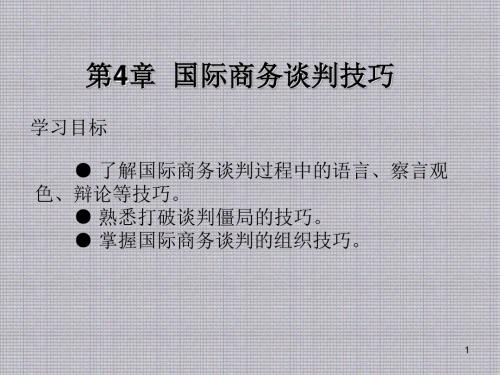
2
案例导入 1995年6月,我某市东方机械设备有限责任公 司部门经理李江与日本某株式会社佐佐一郎先生谈 判达成购买相机胶卷生产线的口头协议。经过细致 的市场调查之后,10月5日,李江组团与日方代表 日方由其国际业务部的中国课课长主谈。一开 始就气势压人:“我们经销的生产线,是日本传统 的优势产品,技术成熟、水平一流,全套设备总价 是500万美元。”课长报完价,漠然一坐,摆出一
10
3
谈判语言的逻辑性要求,是指在国际商务谈判 中,运用语言要概念明确、判断恰当、推理符合逻 国际商务谈判过程中,语言的逻辑性反映在问 题的陈述、提问、回答、辩证、说服等各个方面。 陈述时概念的内涵与外延应保持同一性,语言要前 后衔接,表述问题要有全面性和概括性等。提问时 要做到有的放矢,语言要注意与谈判议题的配合, 使提问尽可能收到预期的效果。回答要切题,一般 不要答非所问(但在特殊情况下,直接回答会给己 方造成严重损害时,可以除外)。说服时要使语音 、语调、语速、表情、手势等恰如其分地反映人的 11
14
2
1
谈判语言的客观性要求,是指在谈判中运用语 言艺术交流思想、传递信息时,应该以客观事实为 依据,并且运用恰当的语言向对方提供令其信服的
在国际商务谈判时,作为供方,其表述要遵循 客观性原则,对自己产品的性能、规格、质量等进 行客观介绍。为使对方信服,必要时还可以当场演 示。华而不实的做法只有一次可能侥幸成功的机会 ,声誉的自毁只会使得客户越来越少,公司的可持 续发展将缺乏根本推动力。作为产品的需求方,在 压低对方产品价格时,要有充分依据,以理服人。 只有让对方感到自己是真诚的合作者,谈判才能顺 利进行下去,并为将来的长期合作打下良好基础。9
6
4.1 人类创造了语言,就是为了交流和沟通。在谈 判中,语言表达能力十分重要,因为叙事清晰、论 点明确、证据充分的语言表达,能够有力地说服对 方,取得相互之间的谅解,协调双方的目标和利益 ,保证谈判的成功。正如谈判专家指出的那样:谈 判技巧的最大秘诀之一,就是善于将自己要说服对
国际商务谈判(第三版)第4章国际商务谈判的准备

一、国际商务谈判计划的特点
(一)合理性 (二)实用性 (三)灵活性
二、谈判计划的制订过程
(一)确定谈判主题 (二)确定谈判目标
1.谈判目标的内容 ❖ 最高目标;实际需求目标;可接受目标;最低目标
2.设定谈判目标层次
上限目标 中限目标
下限目标 3.确定谈判目标的注意事项
(三)拟定谈判要点
1.制定谈判方案的基本要求 简明扼要、具体翔实、机动灵活
此外,在公共场合人们对当面批评是否能够接受、人们 如何对待荣誉及名声等问题、妇女在业务活动中的地位 如何等等,这些社会习俗等都会影响双方意见交流的方 式及所采取的对策,是谈判前必须了解的环境因素。
6.财政金融状况因素 外债状况 外汇储备情况 货币的自由兑换 支付信誉 税法方面的情况
(二)商务谈判前的准备内容
当缺乏对话渠道,或出 于公平考虑时选用
主、客场轮流制
模拟谈判
Green
格林银行
模拟谈判的要求: 每三组人员, 第一组: 助谈人 第二组: Powell先生 第三组: R. Stewart先生
谈判目标: 在第三方的协助下 寻求解决问题的方法
复习思考题
1.影响国际商务谈判的背景因素有哪些? 2.简要说明影响国际商务谈判的法律因素。 3.在谈判准备阶段,谈判人员需要做哪些方面的工作? 4.谈判信息在商务谈判中的作用是什么? 5.谈判的具体目标可分为哪几个层次? 6.如何做好商务谈判信息传递和保密工作? 7.你是如何认识模拟谈判的必要性的?模拟谈判方式有哪些?
4.金融方面的信息
5.有关货单、样品的准备
(二)阻碍人们获得信息的因素
缺乏对于不同文化、消费者偏好、市场需求的敏感度
对国外有差异的环境了解不充分
国际商务谈判教案
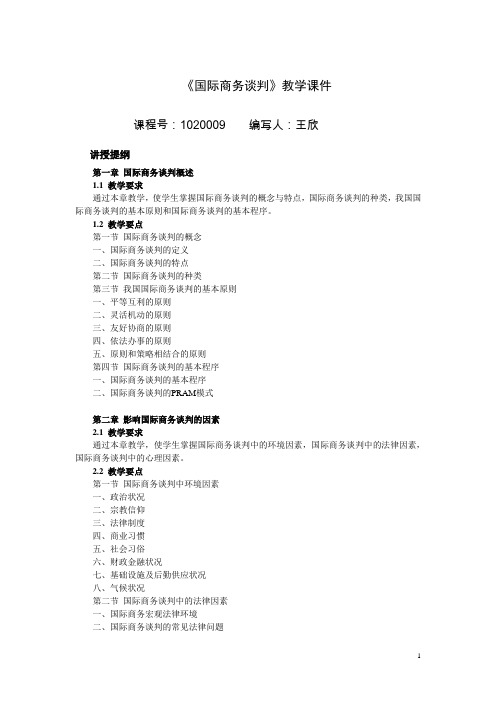
《国际商务谈判》教学课件课程号:1020009 编写人:王欣讲授提纲第一章国际商务谈判概述1.1 教学要求通过本章教学,使学生掌握国际商务谈判的概念与特点,国际商务谈判的种类,我国国际商务谈判的基本原则和国际商务谈判的基本程序。
1.2 教学要点第一节国际商务谈判的概念一、国际商务谈判的定义二、国际商务谈判的特点第二节国际商务谈判的种类第三节我国国际商务谈判的基本原则一、平等互利的原则二、灵活机动的原则三、友好协商的原则四、依法办事的原则五、原则和策略相结合的原则第四节国际商务谈判的基本程序一、国际商务谈判的基本程序二、国际商务谈判的PRAM模式第二章影响国际商务谈判的因素2.1 教学要求通过本章教学,使学生掌握国际商务谈判中的环境因素,国际商务谈判中的法律因素,国际商务谈判中的心理因素。
2.2 教学要点第一节国际商务谈判中环境因素一、政治状况二、宗教信仰三、法律制度四、商业习惯五、社会习俗六、财政金融状况七、基础设施及后勤供应状况八、气候状况第二节国际商务谈判中的法律因素一、国际商务宏观法律环境二、国际商务谈判的常见法律问题第三节国际商务谈判中的心理因素一、国际商务谈判中的个性心理二、国际商务谈判中的群体心理三、谈判心理的禁忌第三章国际商务谈判前的准备3.1 教学要求通过本章教学,使学生掌握国际商务谈判人员的组织与管理,国际商务谈判前的信息准备,谈判目标的确定,谈判方案的制定和确定谈判中各交易条件最低可接受限度。
3.2 教学要点第一节国际商务谈判人员的组织与管理一、商务谈判人员的个体素质二、商务谈判人员的群体构成三、商务谈判人员的管理第二节国际商务谈判前的信息准备一、谈判信息的分类二、谈判信息收集的主要内容三、谈判信息资料的处理第三节谈判目标的确定一、谈判主题的确定二、谈判目标的确定三、谈判目标的优化及其方法第四节谈判方案的制定一、制定谈判方案的基本要求二、谈判方案的主要内容第五节模拟谈判一、模拟谈判的必要性二、拟定假设三、想象谈判全过程第六节确定谈判中各交易条件的最低可接受程度一、价格水平二、支付方式第四章国际商务谈判各阶段的策略4.1 教学要求通过本章教学,使学生掌握国际商务谈判策略概述,开局阶段的策略,报价阶段的策略,成交阶段的策略和处理僵局的策略。
国际商务谈判 Chapter 4 Preparing for Negotiation

4.2 Setting the agenda
From a communication point of view,the process of structuring and controlling a negotiation focuses on the importance of setting an agenda and a procedure for the meeting. The agenda includes the order of the issues to negotiate and its main negotiating methods like what to negotiate first, what others to negotiate later and what is the final goal to attain etc. Whether the agenda is reasonable or not determines the efficiency of the negotiation.
4.3.2 Issues and positions
Any information upon which there is disagreement can be organized into the negotiation issues. That is to say that the issues are the things on which one side takes an affirmative position and the other a negative position. Issues should be pragmatic, for it is difficult to make a definite judgment about unrealistic issues.来自
商务谈判—chapter4
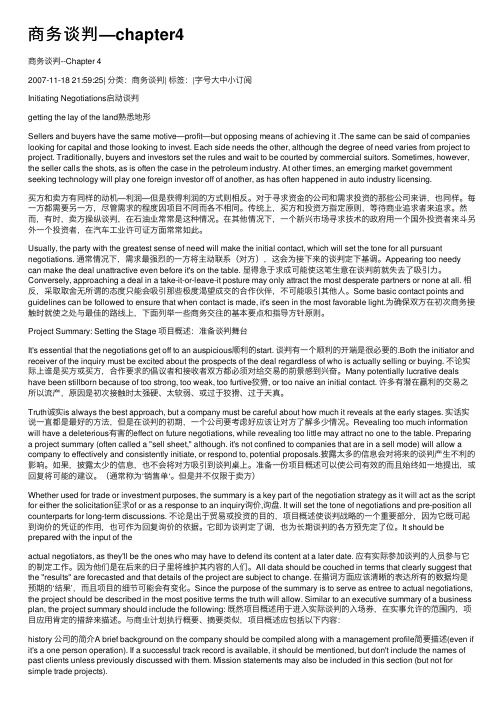
商务谈判—chapter4商务谈判--Chapter 42007-11-18 21:59:25| 分类:商务谈判| 标签:|字号⼤中⼩订阅Initiating Negotiations启动谈判getting the lay of the land熟悉地形Sellers and buyers have the same motive—profit—but opposing means of achieving it .The same can be said of companies looking for capital and those looking to invest. Each side needs the other, although the degree of need varies from project to project. Traditionally, buyers and investors set the rules and wait to be courted by commercial suitors. Sometimes, however, the seller calls the shots, as is often the case in the petroleum industry. At other times, an emerging market government seeking technology will play one foreign investor off of another, as has often happened in auto industry licensing.买⽅和卖⽅有同样的动机—利润—但是获得利润的⽅式则相反。
对于寻求资⾦的公司和需求投资的那些公司来讲,也同样。
每⼀⽅都需要另⼀⽅,尽管需求的程度因项⽬不同⽽各不相同。
国际商务谈判教案
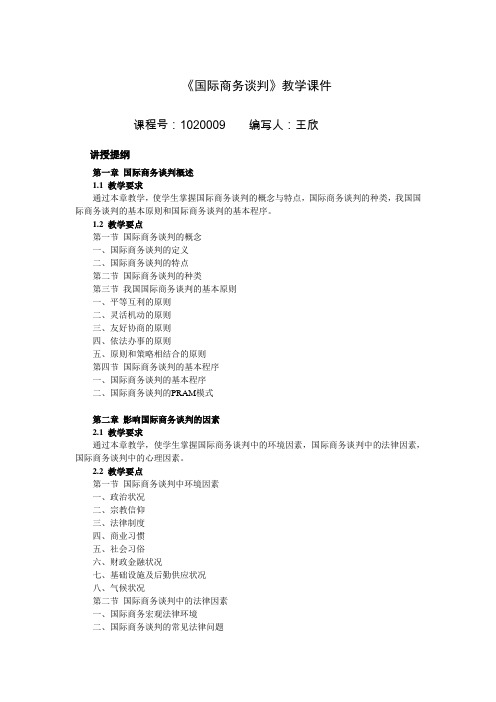
《国际商务谈判》教学课件课程号:1020009 编写人:王欣讲授提纲第一章国际商务谈判概述1.1 教学要求通过本章教学,使学生掌握国际商务谈判的概念与特点,国际商务谈判的种类,我国国际商务谈判的基本原则和国际商务谈判的基本程序。
1.2 教学要点第一节国际商务谈判的概念一、国际商务谈判的定义二、国际商务谈判的特点第二节国际商务谈判的种类第三节我国国际商务谈判的基本原则一、平等互利的原则二、灵活机动的原则三、友好协商的原则四、依法办事的原则五、原则和策略相结合的原则第四节国际商务谈判的基本程序一、国际商务谈判的基本程序二、国际商务谈判的PRAM模式第二章影响国际商务谈判的因素2.1 教学要求通过本章教学,使学生掌握国际商务谈判中的环境因素,国际商务谈判中的法律因素,国际商务谈判中的心理因素。
2.2 教学要点第一节国际商务谈判中环境因素一、政治状况二、宗教信仰三、法律制度四、商业习惯五、社会习俗六、财政金融状况七、基础设施及后勤供应状况八、气候状况第二节国际商务谈判中的法律因素一、国际商务宏观法律环境二、国际商务谈判的常见法律问题第三节国际商务谈判中的心理因素一、国际商务谈判中的个性心理二、国际商务谈判中的群体心理三、谈判心理的禁忌第三章国际商务谈判前的准备3.1 教学要求通过本章教学,使学生掌握国际商务谈判人员的组织与管理,国际商务谈判前的信息准备,谈判目标的确定,谈判方案的制定和确定谈判中各交易条件最低可接受限度。
3.2 教学要点第一节国际商务谈判人员的组织与管理一、商务谈判人员的个体素质二、商务谈判人员的群体构成三、商务谈判人员的管理第二节国际商务谈判前的信息准备一、谈判信息的分类二、谈判信息收集的主要内容三、谈判信息资料的处理第三节谈判目标的确定一、谈判主题的确定二、谈判目标的确定三、谈判目标的优化及其方法第四节谈判方案的制定一、制定谈判方案的基本要求二、谈判方案的主要内容第五节模拟谈判一、模拟谈判的必要性二、拟定假设三、想象谈判全过程第六节确定谈判中各交易条件的最低可接受程度一、价格水平二、支付方式第四章国际商务谈判各阶段的策略4.1 教学要求通过本章教学,使学生掌握国际商务谈判策略概述,开局阶段的策略,报价阶段的策略,成交阶段的策略和处理僵局的策略。
国际商务谈判教案Chapter4 (预习复习)教学文稿

Chapter 4Negotiation: Strategy and PlanningOverviewIn this chapter, we discuss what negotiators should do before opening negotiations. Effective strategy and planning are the most critical precursors for achieving negotiation objectives. With effective planning and target setting, most negotiators can achieve their objectives; without them, results occur more by chance than by negotiator effort.Regrettably, systematic planning is not something that most negotiators do willingly. Although time constraints and work pressures make it difficult to find the time to plan adequately, for many planning is simply boring and tedious, easily put off in favor of getting into the action quickly. It is clear, however, that devoting insufficient time to planning is one weakness that may cause negotiators to fail.The discussion of strategy and planning begins by exploring the broad process of strategy development, starting with defining the negotiator’s goals and objectives then moves to developing a strategy to address the issues and achieve one’s goals. Finally, we address the typical stages and phases of an evolving negotiation and how different issues and goals will affect the planning process.Learning Objectives1.Goals – The focus that drives a negotiation strategy.2.Strategy –The overall plan to achieve one’s goals.3.Getting ready to implement the strategy: The planning process.I.Goals – The Focus That Drives a Negotiation StrategyA.Direct effects of goals on choice of strategy1.There are four important aspects to understand about how goals affect negotiations:a.Wishes are not goals, especially in negotiation.b.Goals are often linked to the other party’s goals.c.There are boundaries or limits to what goals can be.d.Effective goals must be concrete, specific and measurable. If they are not, then itwill be hard to:(1)Communicate to the other party what we want(2)Understand what the other party wants(3)Determine whether an offer on the table satisfies our goals.2.Goals can be tangible or procedural.3.The criteria used to determine goals depend on your specific objectives and yourpriorities among multiple objectives.B.Indirect effects of goals on choice of strategy1.Short-term thinking affects our choice of strategy; in developing and framing ourgoals, we may ignore the present or future relationship with the other party in aconcern for achieving a substantive outcome only.2.Negotiation goals that are complex or difficult to define may require a substantialchange in the other party’s attitude. In most cases, progress will be madeincrementally, and may depend on establishing a relationship with the other party.II.Strategy –The Overall Plan to Achieve One’s GoalsA.Strategy versus Tactics1. A major difference between strategy and tactics is that of scale, perspective orimmediacy.2.Tactics are short-term, adaptive moves designed to enact or pursue broad strategies,which in turn provide stability, continuity, and direction for tactical behaviors.3.Tactics are subordinate to strategy: they are structured, directed, and driven bystrategic considerations.B.Unilateral versus bilateral approaches to strategy1. A unilateral choice is made without the active involvement of the other party.2.Unilaterally pursued strategies can be wholly one-sided and intentionally ignorant ofany information about the other negotiator.3.Unilateral strategies should evolve into ones that fully consider the impact of theother’s strategy on one’s own.C.The dual concerns model as a vehicle for describing negotiation strategies. This modelproposes that individuals have two levels of related concerns: a concern for their ownoutcomes, and a level of concern for the other’s outcomes.1.Alternative situational strategiesa.There are at least four different types of strategies when assessing the relativeimportan ce and priority of the negotiator’s substantive outcome versus therelational outcome: competitive, collaboration, accommodation, and avoidance2.The nonengagement strategy: Avoidancea.There are many reasons why negotiators may choose not to negotiate:(1)If one is able to meet one’s needs without negotiating at all, it may make senseto use an avoidance strategy(2)It simply may not be worth the time and effort to negotiate (although there aresometimes reasons to negotiate in such situations(3)The decision to negotiate is closely related to the desirability of availablealternatives –the outcomes that can be achieved if negotiations don’t work out3.Active-engagement strategies: Competition, collaboration, and accommodationpetition is distributive win-lose bargaining.b.Collaboration is integrative or win-win negotiation.c.Accommodation is as much a win-lose strategy as competition, although it has adecidedly different image it involves an imbalance of outcomes, but in theopposite direction. (“I lose, you win” as opposed to “I win, you lose.”)d.There are drawbacks to these strategies if applied blindly, thoughtlessly orinflexibly:(1)Distributive strategies tend to create “we-they” or “superiority-inferiority”patterns, which may result in a distortion of the other si de’s contributions, aswell as their values, needs and positions.(2)If a negotiator pursues an integrative strategy without regard to the other’sstrategy,then the other may manipulate and exploit the collaborator and takeadvantage of the good faith and goodwill being demonstrated.(3)Accommodative strategies may generate a pattern of constantly giving in tokeep the other happy or to avoid a fight.III.Understanding the Flow of Negotiations: Stages and PhasesA. Phase models of negotiation:1. Initiation2. Problem solving3. ResolutionB. Greenhalgh (2001) suggests that there are seven key steps to an ideal negotiation process:1. Preparation: deciding what is important, defining goals, thinking ahead how to worktogether with the other party.2. Relationship building: getting to know the other party, understanding how you andthe other are similar and different, and building commitment toward achieving amutually beneficial set of outcomes.3. Information gathering: learning what you need to know about the issues, about theother party and their needs, about the feasibility of possible settlements, and aboutwhat might happen if you fail to reach agreement with the other side.4. Information using: at this stage, negotiators assemble the case they want to make fortheir preferred outcomes and settlement, one that will maximize the negotiator’s ownneeds.5. Bidding: the process of making moves from one’s initial, ideal position to the actualoutcome.6. Closing the deal: the objective here is to build commitment to the agreement achievedin the previous phase.7. Implementing the agreement: determining who needs to do what once hands areshaken and the documents signed.IV. Getting Ready to Implement the Strategy: The Planning ProcessA.Defining the issuesually begins with an analysis of what is to be discussed in the negotiation.2.The number of issues in a negotiation, along with the relationship between thenegotiator and the other party, are often the primary determinant of whether one usesa distributive or integrative strategy.3.In any negotiation, a complete list of the issues at stake is best derived from thefollowing sources:a.An analysis of all the possible issues that need to be decided.b.Previous experience in similar negotiations.c.Research conducted to gather information.d.Consultation with experts in that industry.B.Assembling the issues and defining the bargaining mix1.The combination of lists from each side in a negotiation determines the bargainingmix.2.There are two steps a negotiator can use to prioritize the issues on an agenda:a.Determine which issues are most important and which are less important.b.Determine whether the issues are linked together or are separate.C.Defining Interests1.Interests may be:a.Substantive, that is, directly related to the focal issues under negotiation.b.Process-based, that is, related to how the negotiators behave as they negotiate.c.Relationship-based, that is, tied to the current or desired future relationshipbetween the parties.2.Interests may also be based on intangibles of negotiation.D.Knowing limits and alternatives1.Good preparation requires that you establish two clear points:a.Resistance point – the place where you decide that you should absolutely stop thenegotiation rather than continue.b.Alternatives – other agreements negotiators could achieve and still meet theirneeds. Alternatives define whether the current outcome is better than anotherpossibility.E.Setting targets and openings1.Two key points should be defined in this step:a.The specific target point where one realistically expects to achieve a settlementb.The asking price, representing the best deal one can hope to achieve.2.Target setting requires positive thinking about one’s own objectives.3.Target setting often requires considering how to package several issues and objectives.4.Target setting requires an understanding of trade-offs and throwaways.F.Assessing constituents and the social context of a negotiation1.When people negotiate in a professional context, there may be more than two parties.a.There may be more than two negotiators at the table. Multiple parties often leadto the formation of coalitions.b.Negotiators also have constituents who will evaluate and critique them.c.Negotiation occurs in a context of rules – a social system of laws, customs,common business practices, cultural norms, and political cross-pressures.2.“Field analysis” can be used to assess all the key parties in a negotiation.a.Who is, or should be, on the team on my side of the field?b.Who is on the other side of the field?c.Who is on the sidelines and can affect the play of the game? Who are thenegotiation equivalents of owners, managers and strategists?d.Who is in the stands? Who is watching the game, is interested in it, but can onlyindirectly affect what happens?e.What is going on in the broader environment in which the negotiation takesplace?f.What is common and acceptable practice in the ethical system in which the deal isbeing done?g.What is common and acceptable practice given the culture in which thenegotiation is conducted?G.Analyzing the other party1.Learning the other’s issues, preferences, priorities, interests, alternatives andconstraints is almost as important as determining one’s own.2.Several key pieces of background information will be of great importance, including:a.The other party’s resources, issues, and bargaining mix – investigate:(1)Other party’s business history or previous negotiations.(2)Financial data.(3)Inventories.(4)Visit or speak with the other party’s friends and peers.(5)Question past business partners.b.The oth er party’s interests and needs.(1)Conduct a preliminary interview including a broad discussion of what theother party would like to achieve in the upcoming negotiations.(2)Anticipating the other party’s interests.(3)Asking others who know or have negotiated with the other party.(4)Reading how the other party portrays him/herself in the media.c.The other party’s limits (resistance point) and alternative(s).(1)Understanding the other party’s limits and alternatives is important because itwill provide information as to how far you can “push” them.d.The other party’s targets and openings.(1)Systematically gather information directly from the other party.e.Constituents, social structure, and authority to make an agreement.(1)The most direct impact of the broader social context is on the othernegotiator’s ability to make binding agreements.(2)T he negotiator needs to know how the other party’s organization makesdecisions to support or ratify an agreement.f.Reputation and negotiation style.(1)A negotiator’s typical style (integrativ e or distributive approach) is animportant determinant of how to approach the other party in the negotiation.(2)One’s impression of the other party’s reputation may be based on severalfactors:(i)How the other party’s predecessors have negotiated with you in the past.(ii)How the other party has negotiated with you in the past, either in the same or in different contexts.(iii)How the other party has negotiated with others in the past.g.Likely strategy and tactics.(1)Information collected about issues, objectives, reputation, style, alternatives,and authority may indicate a great deal about what strategy the other partyintends to pursue.H.Presenting issues to the other party1.What facts support my point of view?2.Whom may I consult or talk with to help me elaborate or clarify the facts?3.Have these issues been negotiated before by others under similar circumstances?4.What is the other party’s point of view likely to be?5.How can I develop and present the facts so they are most convincing?I.What protocol needs to be followed in this negotiation?1.The agenda2.The location of negotiation3.The time period of negotiation4.Other parties who might be involved in the negotiation5.What might be done if negotiation fails?6.How will we keep track of what is agreed to?7.How do we know whether we have a good agreement?SummaryPlanning is a critically important activity in negotiation. As we noted at the outset, however, negotiators frequently fail to plan for a variety of reasons. Effective planning allows negotiators to design a road map that will guide them to agreement. While this map may frequently need to be modified and updated as discussions with the other side proceed, and as the world around the negotiation changes, working from the map is far more effective than attempting to work without it.We began this chapter with a basic understanding of the concepts of strategy, and we presented a model of negotiation strategy choice, returning to the familiar framework of the dual concerns model. Having described the model, we then discussed the importance of setting clear goals, based on the key issues at stake.When negotiators are able to consider and evaluate each of ten factors of protocol, they will know what they want and will have a clear sense of direction on how to proceed. This sense of direction, and the confidence derived from it, is a very important factor in affecting negotiating outcomes.。
推销与谈判谈判第四章教案
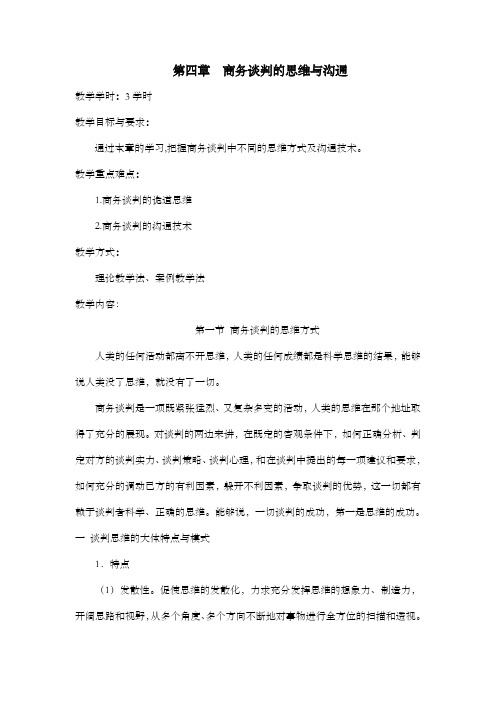
第四章商务谈判的思维与沟通教学学时:3学时教学目标与要求:通过本章的学习,把握商务谈判中不同的思维方式及沟通技术。
教学重点难点:1.商务谈判的诡道思维2.商务谈判的沟通技术教学方式:理论教学法、案例教学法教学内容:第一节商务谈判的思维方式人类的任何活动都离不开思维,人类的任何成绩都是科学思维的结果,能够说人类没了思维,就没有了一切。
商务谈判是一项既紧张猛烈、又复杂多变的活动,人类的思维在那个地址取得了充分的展现。
对谈判的两边来讲,在既定的客观条件下,如何正确分析、判定对方的谈判实力、谈判策略、谈判心理,和在谈判中提出的每一项建议和要求,如何充分的调动己方的有利因素,躲开不利因素,争取谈判的优势,这一切都有赖于谈判者科学、正确的思维。
能够说,一切谈判的成功,第一是思维的成功。
一谈判思维的大体特点与模式1.特点(1)发散性。
促使思维的发散化,力求充分发挥思维的想象力、制造力,开阔思路和视野,从多个角度、多个方向不断地对事物进行全方位的扫描和透视。
在谈判中,发散思维的具体运用要紧有两种情形:一是把与交易有关的所有议题都联系起来,列入议题,而不是孤立的就某个议题而谈论某个议题。
二是在讨论某个议题的时候,不是只讨论内那个议题所涉及的某几个方面,或一二个要紧方面,而是要讨论所有有关的方面。
(2)多样性。
促使思维多样化,要从事物之间的直接联系和间接联系、必然联系和偶然联系、内部联系和外部联系及因果联系等普遍联系中,寻觅解决问题的新路子、新方式。
(3)动态性。
促使思维动态化,在动态中调整和优化思维。
商务谈判的特点之一是其复杂性和多变性。
随着谈判两边意见交流的展开,各类因素在不断的变更,人们的思维必需牢牢抓住这种变更,迅速的调整思维的方向、重点和角度,优化思维的进程和结构。
(4)超前性。
争取超前思维。
谈判中,若是能在思维上领先于对方一步,超前考虑到某些问题,准确的预见到某个事物的转变进展趋势,那么必然在谈判中占有极大的主动,并取得庞大的利益。
《国际商务谈判》(第四版)第四章 国际商务谈判开局阶段的策略

权力有限策略之所以能发挥作用,是因为当一个谈判人员的 权力受到限制以后,反而能够经常处于较有利的地位。
国际商务谈判
第四章 开局技巧
第三节 谋取谈判主动权策略
五、谈判技巧优势策略 (一)主动谈判措施 (二)回答问题的技巧 1、不要彻底答复对方的提问 2、针对提问者的真实心理进行答复 3、不要确切答复对方的提问 4、降低提问者追问的兴致 5、让自己获得充分的思考时间 6、礼貌地拒绝不值得答复的问题 7、找借口拖延答复
保留式开局策略是指在谈判开始时,己方采取保守的态度, 不明确阐明己方的立场和观点,对谈判对手提出的关键性问题 不作彻底的、确切的回答,从而给对手造成神秘感,以吸引对 手步入谈判。 案例4-2
国际商务谈判
第四章 开局技巧 二、开局目标的表达
(三)慎重式开局策略 慎重式开局策略是指以严谨、凝重的语言进行陈述,表达
(一)谈判的时间安排 (二)谈判主题、目标及议题的确定 (三)通则议程与细则议程
国际商务谈判
第四章 开局技巧
一、谈判议程的内容 (一)谈判的时间安排
(1)对于双方意见分歧不太大的议题应尽量在较短的时间 内解决,以避免无谓的争辩和浪费。
(2)对于主要的议题或争执较大的焦点问题,可将其安排 在整个谈判的后半程加以讨论;如果把焦点性问题放在谈判进 行到总时间3/5的前两个小时之内提出来,那么就会更有利于问 题的解决。
国际商务谈判
第四章 开局技巧 第一节 开局阶段的控制策略 第二节 确定谈判议程策略 第三节 谋取谈判主动权策略
国际商务谈判
第四章 开局技巧
第一节 开局阶段的控制策略
- 1、下载文档前请自行甄别文档内容的完整性,平台不提供额外的编辑、内容补充、找答案等附加服务。
- 2、"仅部分预览"的文档,不可在线预览部分如存在完整性等问题,可反馈申请退款(可完整预览的文档不适用该条件!)。
- 3、如文档侵犯您的权益,请联系客服反馈,我们会尽快为您处理(人工客服工作时间:9:00-18:30)。
Chapter 4Negotiation: Strategy and PlanningOverviewIn this chapter, we discuss what negotiators should do before opening negotiations. Effective strategy and planning are the most critical precursors for achieving negotiation objectives. With effective planning and target setting, most negotiators can achieve their objectives; without them, results occur more by chance than by negotiator effort.Regrettably, systematic planning is not something that most negotiators do willingly. Although time constraints and work pressures make it difficult to find the time to plan adequately, for many planning is simply boring and tedious, easily put off in favor of getting into the action quickly. It is clear, however, that devoting insufficient time to planning is one weakness that may cause negotiators to fail.The discussion of strategy and planning begins by exploring the broad process of strategy development, starting with defining the negotiator’s goals and objectives then moves to developing a strategy to address the issues and achieve one’s goals. Finally, we address the typical stages and phases of an evolving negotiation and how different issues and goals will affect the planning process.Learning Objectives1.Goals – The focus that drives a negotiation strategy.2.Strategy –The overall plan to achieve one’s goals.3.Getting ready to implement the strategy: The planning process.I.Goals – The Focus That Drives a Negotiation StrategyA.Direct effects of goals on choice of strategy1.There are four important aspects to understand about how goals affectnegotiations:a.Wishes are not goals, especially in negotiation.b.Goals are often linked to the other party’s goals.c.There are boundaries or limits to what goals can be.d.Effective goals must be concrete, specific and measurable. Ifthey are not, then it will be hard to:(1)Communicate to the other party what we want(2)Understand what the other party wants(3)Determine whether an offer on the table satisfies our goals.2.Goals can be tangible or procedural.The criteria used to determine goals depend on your specificobjectives and your priorities among multiple objectives.B.Indirect effects of goals on choice of strategy1.Short-term thinking affects our choice of strategy; in developing andframing our goals, we may ignore the present or future relationshipwith the other party in a concern for achieving a substantive outcomeonly.2.Negotiation goals that are complex or difficult to define may requirea substantial change in the other party’s attitude. In most cases,progress will be made incrementally, and may depend on establishing arelationship with the other party.II.Strategy –The Overall Plan to Achieve One’s GoalsA.Strategy versus Tactics1. A major difference between strategy and tactics is that of scale,perspective or immediacy.2.Tactics are short-term, adaptive moves designed to enact or pursuebroad strategies, which in turn provide stability, continuity, anddirection for tactical behaviors.3.Tactics are subordinate to strategy: they are structured, directed,and driven by strategic considerations.B.Unilateral versus bilateral approaches to strategy1. A unilateral choice is made without the active involvement of theother party.2.Unilaterally pursued strategies can be wholly one-sided andintentionally ignorant of any information about the other negotiator.3.Unilateral strategies should evolve into ones that fully consider theimpact of the other’s strategy on one’s own.C.The dual concerns model as a vehicle for describing negotiationstrategies. This model proposes that individuals have two levels ofrelated concerns: a concern for their own outcomes, and a level ofconcern for the other’s outcomes.1.Alternative situational strategiesa.There are at least four different types of strategies whenassessing the relative importance and priority of thenegotiator’s substantive outcome versus the relational outcome:competitive, collaboration, accommodation, and avoidance2.The nonengagement strategy: Avoidancea.There are many reasons why negotiators may choose not to negotiate:(1)If one is able to meet one’s needs without negotiating at all,it may make sense to use an avoidance strategy(2)It simply may not be worth the time and effort to negotiate(although there are sometimes reasons to negotiate in suchsituationsThe decision to negotiate is closely related to thedesirability of available alternatives – the outcomes that canbe achieved if negotiations don’t work out3.Active-engagement strategies: Competition, collaboration, andaccommodationpetition is distributive win-lose bargaining.b.Collaboration is integrative or win-win negotiation.c.Accommodation is as much a win-lose strategy as competition,although it has a decidedly different image it involves animbalance of outcomes, but in the opposite direction. (“I lose,you win” as opposed to “I win, you lose.”)d.There are drawbacks to these strategies if applied blindly,thoughtlessly or inflexibly:(1)Distributive strategies tend to create “we-they” or“superiority-inferiority” patterns, which may result in adistortion of the other si de’s contributions, as well as theirvalues, needs and positions.(2)If a negotiator pursues an integrative strategy without regardto the other’s strategy,then the other may manipulate andexploit the collaborator and take advantage of the good faithand goodwill being demonstrated.(3)Accommodative strategies may generate a pattern of constantlygiving in to keep the other happy or to avoid a fight.III.Understanding the Flow of Negotiations: Stages and PhasesA. Phase models of negotiation:1. Initiation2. Problem solving3. ResolutionB. Greenhalgh (2001) suggests that there are seven key steps to an idealnegotiation process:1. Preparation: deciding what is important, defining goals, thinkingahead how to work together with the other party.2. Relationship building: getting to know the other party, understandinghow you and the other are similar and different, and buildingcommitment toward achieving a mutually beneficial set of outcomes.3. Information gathering: learning what you need to know about theissues, about the other party and their needs, about the feasibilityof possible settlements, and about what might happen if you fail to reach agreement with the other side.4. Information using: at this stage, negotiators assemble the case theywant to make for their preferred outcomes and settlement, one that will maximize the negotiator’s own needs.5. Bidding: the process of making moves from one’s initial, idealposition to the actual outcome.6. Closing the deal: the objective here is to build commitment to theagreement achieved in the previous phase.7. Implementing the agreement: determining who needs to do what oncehands are shaken and the documents signed.IV. Getting Ready to Implement the Strategy: The Planning ProcessA.Defining the issuesually begins with an analysis of what is to be discussed in thenegotiation.2.The number of issues in a negotiation, along with the relationshipbetween the negotiator and the other party, are often the primarydeterminant of whether one uses a distributive or integrativestrategy.3.In any negotiation, a complete list of the issues at stake is bestderived from the following sources:a.An analysis of all the possible issues that need to be decided.b.Previous experience in similar negotiations.c.Research conducted to gather information.d.Consultation with experts in that industry.B.Assembling the issues and defining the bargaining mix1.The combination of lists from each side in a negotiation determinesthe bargaining mix.2.There are two steps a negotiator can use to prioritize the issues onan agenda:a.Determine which issues are most important and which are lessimportant.b.Determine whether the issues are linked together or are separate.C.Defining Interests1.Interests may be:a.Substantive, that is, directly related to the focal issues undernegotiation.b.Process-based, that is, related to how the negotiators behave asthey negotiate.c.Relationship-based, that is, tied to the current or desired futurerelationship between the parties.2.Interests may also be based on intangibles of negotiation.D.Knowing limits and alternatives1.Good preparation requires that you establish two clear points:a.Resistance point – the place where you decide that you shouldabsolutely stop the negotiation rather than continue.b.Alternatives – other agreements negotiators could achieve andstill meet their needs. Alternatives define whether the currentoutcome is better than another possibility.E.Setting targets and openings1.Two key points should be defined in this step:a.The specific target point where one realistically expects toachieve a settlementThe asking price, representing the best deal one can hope toachieve.2.Target setting requires positive thinking about one’s own objectives.3.Target setting often requires considering how to package severalissues and objectives.4.Target setting requires an understanding of trade-offs and throwaways.F.Assessing constituents and the social context of a negotiation1.When people negotiate in a professional context, there may be morethan two parties.a.There may be more than two negotiators at the table. Multipleparties often lead to the formation of coalitions.b.Negotiators also have constituents who will evaluate and critiquethem.c.Negotiation occurs in a context of rules – a social system oflaws, customs, common business practices, cultural norms, andpolitical cross-pressures.2.“Field analysis” can be used to assess all the key parties in anegotiation.a.Who is, or should be, on the team on my side of the field?b.Who is on the other side of the field?c.Who is on the sidelines and can affect the play of the game? Whoare the negotiation equivalents of owners, managers andstrategists?d.Who is in the stands? Who is watching the game, is interested init, but can only indirectly affect what happens?e.What is going on in the broader environment in which thenegotiation takes place?f.What is common and acceptable practice in the ethical system inwhich the deal is being done?g.What is common and acceptable practice given the culture in whichthe negotiation is conducted?G.Analyzing the other party1.Learning the other’s issues, preferences, priorities, interests,alternatives and constraints is almost as important as determiningone’s own.2.Several key pieces of background information will be of greatimportance, including:a.The other party’s resources, issues, and bargaining mix –investigate:(1)Other party’s business history or previous negotiations.(2)Financial data.(3)Inventories.(4)Visit or speak with the other party’s friends and peers.(5)Question past business partners.b.The othe r party’s interests and needs.(1)Conduct a preliminary interview including a broad discussion ofwhat the other party would like to achieve in the upcomingnegotiations.(2)Anticipating the other party’s interests.(3)Asking others who know or have negotiated with the other party.(4)Reading how the other party portrays him/herself in the media.The other party’s limits (resistance point) and alternative(s).(5)Understanding the other party’s limits and alternatives isimportant because it will provide information as to how far youcan “push” them.c.The other party’s targets and openings.(1)Systematically gather information directly from the other party.d.Constituents, social structure, and authority to make an agreement.(1)The most direct impact of the broader social context is on theother negotiator’s ability to make binding agreements.(2)T he negotiator needs to know how the other party’sorganization makes decisions to support or ratify an agreement.e.Reputation and negotiation style.(1)A negotiator’s typical style (integrative or distributiveapproach) is an important determinant of how to approach theother party in the negotiation.(2)One’s impression of the other party’s reputation may be basedon several factors:(i)How the other party’s predecessors have negotiated with youin the past.(ii)How the other party has negotiated with you in the past,either in the same or in different contexts.(iii)How the other party has negotiated with others in the past.f.Likely strategy and tactics.(1)Information collected about issues, objectives, reputation,style, alternatives, and authority may indicate a great dealabout what strategy the other party intends to pursue.H.Presenting issues to the other party1.What facts support my point of view?2.Whom may I consult or talk with to help me elaborate or clarify thefacts?3.Have these issues been negotiated before by others under similarcircumstances?4.What is the other party’s point of view likely to be?5.How can I develop and present the facts so they are most convincing?I.What protocol needs to be followed in this negotiation?1.The agenda2.The location of negotiation3.The time period of negotiation4.Other parties who might be involved in the negotiation5.What might be done if negotiation fails?6.How will we keep track of what is agreed to?7.How do we know whether we have a good agreement?SummaryPlanning is a critically important activity in negotiation. As we noted at the outset, however, negotiators frequently fail to plan for a variety of reasons. Effective planning allows negotiators to design a road map that will guide them to agreement. While this map may frequently need to be modified and updated as discussions with the other side proceed, and as the world around the negotiation changes, working from the map is far more effective than attempting to work without it.We began this chapter with a basic understanding of the concepts of strategy, and we presented a model of negotiation strategy choice, returning to the familiar framework of the dual concerns model. Having described the model, we then discussed the importance of setting clear goals, based on the key issues at stake.When negotiators are able to consider and evaluate each of ten factors of protocol, they will know what they want and will have a clear sense of direction on how to proceed. This sense of direction, and the confidence derived from it, is a very important factor in affecting negotiating outcomes.(注:可编辑下载,若有不当之处,请指正,谢谢!)。
